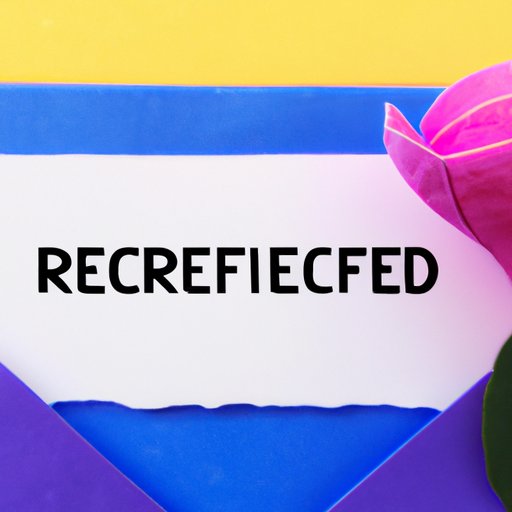
Introduction
Dealing with rejection can be a challenging experience, whether it is a professional, personal, or romantic rejection. Everyone faces rejections at some point in life. Emotionally, rejections can leave a lasting impact on one’s mindset, self-confidence, and emotional well-being. While it is natural to feel sad or upset after being rejected, it is essential to learn how to deal with rejection and move forward positively. In this article, we will discuss strategies to help readers deal with rejection and build a growth mindset that allows them to bounce back from setbacks.
Develop a Growth Mindset
Before discussing strategies to overcome rejection, it is essential to understand what a growth mindset is and why it is essential. A growth mindset is rooted in the belief that skills and abilities can be developed through dedication, hard work, and the right mindset. It is distinct from a fixed mindset, where people believe that their abilities are innate and unchangeable.
Having a growth mindset is helpful for dealing with rejections because it allows individuals to view setbacks as opportunities to learn and grow. A growth mindset promotes mental flexibility, resilience, and adaptability, which are essential qualities in today’s rapidly changing world.
To adopt a growth mindset, readers can begin by focusing on personal development, embracing challenges, and adopting a positive self-talk. They can remind themselves that rejections are temporary, and their skills and abilities can be developed over time through dedication and hard work. Readers can also look for opportunities to learn from their mistakes and focus on progress rather than perfection.
Know Your Worth
Rejections can often trigger feelings of inadequacy and self-doubt. It is easy to fall into the trap of taking rejection personally, but it is essential to remember that rejection is not a reflection of one’s worth. Everyone has unique strengths and qualities that make them valuable.
To build self-confidence and self-esteem, readers can take inventory of their strengths and accomplishments regularly. It is essential to acknowledge personal achievements, no matter how small, to realize their strengths. Readers can also engage in positive self-talk and refrain from self-criticism. They can practice self-care by getting enough rest, engaging in physical activity, and eating a balanced diet.
Practice Resilience
Resilience is the ability to bounce back from setbacks. It is a fundamental quality that allows individuals to thrive in the face of adversity. Building resilience takes time, effort, and a willingness to take concrete steps to overcome challenges.
Readers can practice resilience by developing healthy coping mechanisms. These may include practicing mindfulness, seeking social support, practicing self-care, or connecting with a professional therapist. Readers can also find opportunities to challenge themselves and take calculated risks that promote personal growth. They can learn from their failures, embrace setbacks as opportunities to learn and grow, and find ways to stay motivated and focused on their goals.
Manage Self-doubt
Rejections can trigger feelings of self-doubt and negative self-talk. It is essential to recognize these feelings and find ways to manage them positively. One strategy is to seek support from friends, family, or a professional therapist. Supportive individuals can provide a healthy perspective, offer guidance, and help validate one’s feelings and emotions.
Readers can also learn to manage self-doubt by practicing mindfulness and self-awareness. This involves recognizing negative self-talk, challenging negative beliefs, and reframing negative thoughts positively. Readers can also focus on self-esteem building activities, such as taking care of their physical health, connecting with others, pursuing hobbies and interests, and celebrating their accomplishments.
Analyze Feedback
Rejection can often provide valuable feedback that can be used to improve skills and abilities. It is essential to look at rejections constructively and identify areas for improvement. Readers can find ways to solicit constructive feedback, whether it is from a mentor, colleague, or professional coach. They can use this feedback to identify blind spots and find ways to improve their skills and abilities.
Readers can also seek feedback through self-reflection. This involves looking at one’s attitudes, behaviors, and perspectives critically. Self-reflection helps individuals take ownership of problems, identify solutions, and find ways to grow and learn.
Develop Resilient Thinking
Resilient thinking involves adopting a flexible and optimistic mindset. It is a way of thinking that promotes positivity and encourages individuals to focus on solutions rather than problems. To cultivate resilient thinking, readers can begin by adopting positive thinking patterns. This may involve reframing negative beliefs positively, practicing gratitude, and focusing on future possibilities rather than past failures.
Readers can also find ways to cultivate optimism by surrounding themselves with positive influences, such as supportive friends and family, motivational books and podcasts, or motivational speakers.
Keep Trying
Perhaps the most crucial strategy when dealing with rejection is to keep trying. Rejections are a natural part of life. They do not define one’s worth or potential. It is essential to persist in the face of setbacks, keep learning and growing, and find ways to stay motivated and focused on the long-term goal.
It is important to remember that even successful people face rejections. Every rejection provides an opportunity to learn and grow. By adopting a growth mindset, building resilience, and staying persistent, readers can overcome rejections and achieve their goals.
Conclusion
In conclusion, dealing with rejection is a crucial skill that allows individuals to build a resilient mindset and achieve their goals. By adopting a growth mindset, building self-confidence, and resilience, and persisting in the face of setbacks, readers can overcome rejections and achieve their goals.
If you are struggling with rejection, remember that you are not alone. Rejections can be tough, but they also provide an opportunity to learn and grow. By incorporating the strategies outlined in this article, you can improve your resilience and overcome rejections with confidence and positivity.
So, keep trying, stay positive, and remember that every rejection brings you one step closer to your ultimate success.




